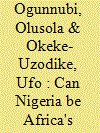| Srl | Item |
| 1 |
ID:
144697


|
|
|
|
|
| Summary/Abstract |
Does the reference to regional hegemony in the African context apply to Nigeria? This study examines this question in line with increasing claims in academic and diplomatic circles of Nigerian hegemony in Africa. While scholars and leading opinion holders have described Nigeria's influence in Africa as typical of a regional hegemon, this paper interrogates the substance of this argument in the context of the nature of the country's foreign policy relations in Africa. Against this background, the article contends that Nigeria actually enjoys a dwindling influence in Africa notwithstanding its current status as Africa's largest economy. The article argues that although Nigeria has never officially harboured any hegemonic aspirations, this hardly disqualifies it from being Africa's hegemonic power. It takes the position that Nigeria remains an important regional power on the continent but is hindered by several factors in playing a hegemonic role. In making this assertion, the article considers a number of conditions that increasingly deflate Nigeria's capacity to play a meaningful hegemonic role in Africa. In doing this, it critically assesses the inherent internal and constraining external conditions that diminish Nigeria's claims to or credentials for effective regional hegemony.
|
|
|
|
|
|
|
|
|
|
|
|
|
|
|
|
| 2 |
ID:
154923


|
|
|
|
|
| Summary/Abstract |
Hegemonic stability theory holds that a dominant power can produce international cooperation by providing public goods and resolving collective action dilemmas. Successful hegemons also resist the temptation to exploit their advantages in order to reduce other states’ fear of domination. This article asks whether or not the internet needs the United States to play a similar role. If so, Washington should pursue policies designed to strengthen internet security while eschewing espionage and cyberattacks that rely on some degree of internet insecurity. If not, it can go on the offensive without fear of undermining the system as a whole. We examine the technical and political fallout from revealed offensive cyberoperations to assess the relative fragility of the internet. Our findings suggest that it is relatively resilient.
|
|
|
|
|
|
|
|
|
|
|
|
|
|
|
|
| 3 |
ID:
155795


|
|
|
|
|
| Summary/Abstract |
This paper examines the utility of the hegemonic stability theory in understanding regional power dynamics within Africa. The study operationalizes the concept of regional hegemony by drawing insights from a comparative foreign policy analysis of African regional powers, with emphasis on Nigeria. Using a largely qualitative methodology supplemented with primary data, the paper examines the underlying assertions of Nigeria’s perceived ‘hegemonic’ influence. Through the use of the hegemonic stability theory as a theoretical lens, this paper argues that Nigeria’s foreign policy shows few signs of a continental hegemonic disposition. In applying this theory at a regional level of analysis, the study finds very little empirical evidence that it fits the African regional context. In short, hegemonic claims in Africa are mere (un)official rhetoric and lack substance.
|
|
|
|
|
|
|
|
|
|
|
|
|
|
|
|
| 4 |
ID:
159863


|
|
|
|
|
| Summary/Abstract |
Political economy debates about the influence of power configurations in expanding and maintaining global liberalization ebb and flow with the wax and wane of the concentration of power in the international system. This article engages the debate in a novel way from previous scholarship. Employing a series of econometric models that account for regional power, I argue that the global power concentration is ill fit to be the primary predictor of trade liberalization, but instead, regional power fluctuations can dampen and enhance global trends. By incorporating subsystemic power configurations, we gain a better understanding of the regional variation in states buying into or cashing out of interdependence.
|
|
|
|
|
|
|
|
|
|
|
|
|
|
|
|